Review of Krilja's second album "Sosnitsa: Roma Music from Russia & Eastern Europe in Rock'n'Reel Magazine, February 2024

Review of Krilja's debut album in Fatea Magazine, spring of 2022
"Krilja is a trio based in Gothenburg, Sweden, who play traditional Roma/Gypsy songs from Russia and Eastern Europe. The music is mostly 19th century and covers the whole spectrum between lyrical and fiery. This is a remix and remastering of the debut album from 2015 by Marita Johansson (vocals), Jonas Liljeström (fiddle) and the flamenco guitarist Emil Pernblad. They sing in Romanes (the traditional Romany language) and Russian, and the songs are searing and emotional much of the time. The name "Krilja" means "wings". The remixing here has not been overdone. This recording has a nice rustic feel about it…you can hear the chairs creaking in the studio, breathing noise and the occasional tap on a microphone that are often edited out in modern recordings, but it all lends a 'live' feel to the recording that I really like.
There are 14 tracks on this album and if you have little experience of Romany music then this would seem a great place to start. The Klezmer feel very is strong in places in some of these songs yet there are overtones of the music of the Far East and an occasional soupçon of Fado in many of the slower passages. Me Ke Tume is one example of this along with Lumba, another song with strong Klezmer influence and Russian roots are showing. You can't stop tapping your foot to this, but you will get tired as this builds to a frenzied climax! The opening track Kaj Te Džav is pure gypsy jazz with its riotous fiddle and lovely rhythm guitar that shows a strong flamenco influence as does Hallgató, a slow, moody ballad that reeks of Fado and flamenco in equal measure. Skore Dien has a much more traditional gypsy feel to my ears with searing soulful fiddle intertwined with sparing guitar and a gut-wrenching vocal from Marita. Of all the songs on this album this is the one where I wish I understood the lyrics.
Romany music is often played at ceremonial occasions and social events and it is common to mix songs with very danceable tunes. Magyar Tantz - is a medley of Transylvanian dance music paired with Sephardic Jewish singing that is almost an entire concert in itself! Xabarka is another such that seems to show off its Russian roots with pride and has a most singable "Na- na-nay-nay" chorus that few will be able to resist! Some wonderful rhythm guitar and fiddle. I expect this is a real showstopper at the end of many a concert. Matyilem has rather a radio-friendly feel to it with some unusual hand drumming on a very joyful song that, for the first time, features the boys on some backing vocals which makes a nice change.
If you appreciate top quality vocal and instrumental skills you will enjoy this excursion into the Romany world. Whatever music 'floats your boat' there's lots here to enjoy.
/ Philip Thomas, Fatea Magazine
Quote from a review of Krilja's second album "Sosnitsa: Roma Music from Russia & Eastern Europe" at www.rootstime.be, published in October 2023
"Singer-guitarist Marita Johansson, fiddler Jonas Liljeström and guitar player Emil Pernblad are Swedish musicians from Gothenburg that have specialized in performing traditional folk music. Under the band name ‘Salamander’ they do this with Jewish classic folksongs on the album ‘Jojnes Trojm’. As ‘Krilja’ the same three musicians are on the record “Sosnitsa’ bringing new life into joyful and melancholic traditionals arising from the ancient Roma- and gypsy population in Russia and Eastern Europe.“

